The Path to Treatment: Does It Matter? Relapse and the Reason for Seeking Treatment
- 1 Auburn University, United States
Abstract
Problem statement: Substance abuse is difficult to treat and many of those who struggle with substance abuse do not see treatment as necessary. Moreover, relapse is common among those who receive treatment. Family and friends of Individuals With Addictions (IWAs) sometimes use ultimatums to encourage the IWA to enter treatment. What is less clear is whether IWAs are more likely to relapse if they enter treatment due to an ultimatum as opposed to entering by their own choice. Exploring how effective IWAs perceive ultimatums to be in facilitating sustained sobriety based on their own personal experiences may help shed light on the utility of treatment obtained under these coerced conditions. Approach: IWAs were contacted through on-line support groups to participate in an internet based study exploring their substance abuse history and experiences with ultimatums. Eighty-one IWAs completed an on-line questionnaire designed to solicit quantitative and qualitative responses developed for the present descriptive study. Results: Three-fourths of participating IWAs who sought treatment due to an ultimatum subsequently relapsed and current length of sobriety was not related to sobriety attempts resulting from ultimatums. However, individuals who identified crack/cocaine as their substance of choice perceived ultimatums as more helpful than individuals who identified alcohol as their substance of choice. Emergent coding revealed that nearly half of participating IWAs reported that there were no benefits to ultimatums and 40% of those with personal experience with ultimatums reported no personal benefits. Conclusion/Recommendations: Overall, IWAs do not perceive ultimatums to be effective and they are likely to relapse when seeking treatment due to an ultimatum, though some IWAs believed ultimatums had benefits, suggesting that ultimatums may be more helpful depending on the particular characteristics of the IWA. Study findings suggested a need to identify other ways significant others can support IWAs in sobriety.
DOI: https://doi.org/10.3844/crpsp.2010.29.34

- 6,090 Views
- 3,728 Downloads
- 5 Citations
Download
Keywords
- Intervention
- ultimatum
- addiction
